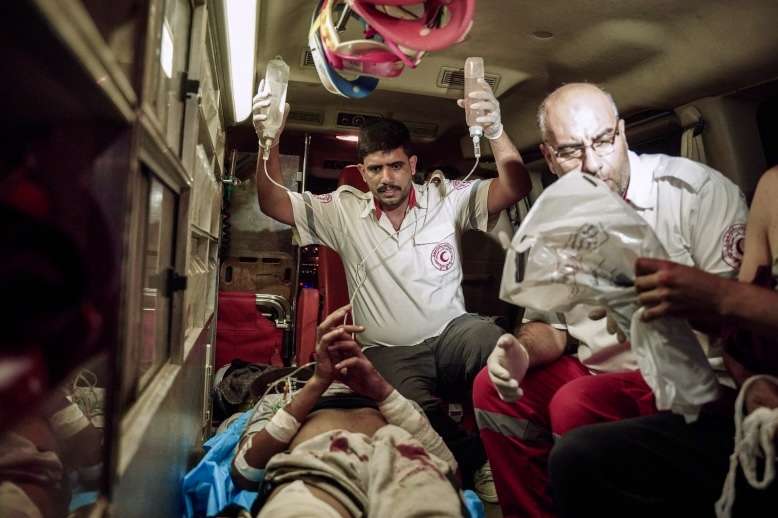Gaza workers say nearly no medical supplies are being delivered

Aid organisations have said that the medical circumstances in Gaza are still dire, as Israeli restrictions continue to stop the delivery of nearly all medical provisions against the backdrop of a delicate ceasefire, Middle East Eye plus agencies reported on October 25th.
According to the World Health Organization (WHO), only around 10 per cent of the requested medical supplies have reached Gaza since the ceasefire.
Lena Dajani, a volunteer Gaza medical aid coordinator, said: “Almost every doctor I’ve spoken to has said that nothing has changed in the healthcare sector.”

Hospitals remain overwhelmed with patients who in other countries would be in intensive care. Health workers in Gaza report that the Strip’s hospitals are facing severe shortages of essential supplies, with conditions worsening despite the ceasefire. A major concern is the lack of disinfectants.
“Sepsis is a big issue, there’s not a lot of disinfectant available. Hospitals are breeding grounds for viruses and bacteria,” Dajani said.
She said that the demand is not just for medical supplies and equipment. Overcrowding continues, with patients forced to sleep on the floor and discharged to makeshift tents. “We’re talking about patients that in any other country would be in the ICU. There were patients that had just come out of a coma after shrapnel wounds to their vertebrae that were sleeping on the ground.”
One of the cases Dajani dealt with involved a child named Saab, who was evacuated from north Gaza amid Israel’s military campaign and had consequently lost half of his skull. She said: “He was sleeping on the floor, and they told him he had to leave. There’s no medical support, beds haven’t been coming in, no medical equipment or delegations have entered to even let the doctors breathe for a moment.”
Medications for chronic illnesses and children’s neurological conditions are also missing. Dajani said many children have developed seizures triggered by trauma and bombings, yet anti-epileptic drugs such as Keppra syrup remain unavailable.
“A lot of children developed seizures from the trauma,” Dajani said. “Even if they were predisposed to having these seizures because of their conditions, they were triggered by certain things, the bombs going off.”
A shortfall of infrastructure and electricity also means that medicine that needs to be refrigerated such as insulin, which is used for diabetes, is not able to be stored.
Meanwhile, Gaza’s border crossings remain heavily controlled. Although some aid trucks have been permitted entry, many vital items are still being held back. Reportedly, only around 90 trucks are entering the territory each day, a fraction of what humanitarian agencies say is needed to meet the population’s urgent medical and humanitarian demands.
Essential medical equipment and mobility aids for people with disabilities such as wheelchairs, prosthetics, and crutches are also being reportedly blocked.
Bahaa Zaqout, who is the director of external relations at PARC, a Palestinian NGO that monitors aid delivery, said to Middle East Eye that nearly no medical equipment or medication has reached the Gaza Strip since the ceasefire came into effect.
“You cannot even find paracetamol. Even the simplest medication is not available in pharmacies and hospitals,” Zaqout said.
The number of people with disabilities across Gaza has surged amid Israel’s genocide. A report by the Gaza City-based NGO Atfaluna Society for Deaf Children found that 58,000 people were living with disabilities, while an estimated 22,500 of those wounded in Israel’s onslaught had sustained life-changing injuries requiring rehabilitation.
The report also found that 83 percent of their respondents with disabilities reported that one of their assistive devices was lost during displacement. The organisation further estimated that 35,000 people would be at risk of short-term or permanent hearing loss.
Even though active fighting has eased under the ceasefire, the health crisis in Gaza has not abated. Hospitals lack basic supplies, medical evacuations are still constrained, and health-workers say the system remains on the edge of collapse. Unless access for aid and medical materials is expanded, many more patients risk dying from treatable conditions, not just war injuries.
Middle East Eye plus agencies, Maghrebi.org, Atfaluna Society for Deaf Children
Want to chase the pulse of North Africa?
Subscribe to receive our FREE weekly PDF magazine












